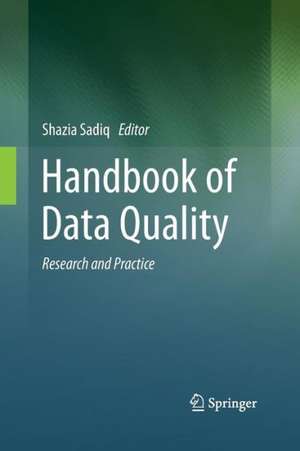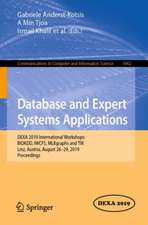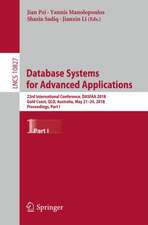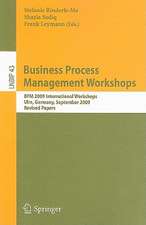Handbook of Data Quality: Research and Practice
Editat de Shazia Sadiqen Limba Engleză Paperback – 20 iun 2015
With these changes, traditional approaches to data management in general, and data quality control specifically, are challenged. There is an evident need to incorporate data quality considerations into the whole data cycle, encompassing managerial/governance as well as technical aspects.
Data quality experts from research and industry agree that a unified framework for data quality management should bring together organizational, architectural and computational approaches. Accordingly, Sadiq structured this handbook in four parts: Part I is on organizational solutions, i.e. the development of data quality objectives for the organization, and the development of strategies to establish roles, processes, policies, and standards required to manage and ensure data quality. Part II, on architectural solutions, covers the technology landscape required to deploy developed data quality management processes, standards and policies. Part III, on computational solutions, presents effective and efficient tools and techniques related to record linkage, lineage and provenance, data uncertainty, and advanced integrity constraints. Finally, Part IV is devoted to case studies of successful data quality initiatives that highlight the various aspects of data quality in action. The individual chapters present both an overview of the respective topic in terms of historical research and/or practice and state of the art, as well as specific techniques, methodologies and frameworks developed by the individual contributors.
Researchers and students of computer science, information systems, or business management as well as data professionals and practitioners will benefit most from this handbook by not only focusing on the various sections relevant to their research area or particular practical work, but by also studying chapters that they may initially consider not to be directly relevant to them, as there they will learn about new perspectives and approaches.
| Toate formatele și edițiile | Preț | Express |
|---|---|---|
| Paperback (1) | 327.24 lei 38-44 zile | |
| Springer Berlin, Heidelberg – 20 iun 2015 | 327.24 lei 38-44 zile | |
| Hardback (1) | 346.56 lei 6-8 săpt. | |
| Springer Berlin, Heidelberg – 23 mai 2013 | 346.56 lei 6-8 săpt. |
Preț: 327.24 lei
Preț vechi: 409.05 lei
-20% Nou
Puncte Express: 491
Preț estimativ în valută:
62.62€ • 65.38$ • 51.82£
62.62€ • 65.38$ • 51.82£
Carte tipărită la comandă
Livrare economică 01-07 aprilie
Preluare comenzi: 021 569.72.76
Specificații
ISBN-13: 9783642441844
ISBN-10: 364244184X
Pagini: 452
Ilustrații: XII, 438 p.
Dimensiuni: 155 x 235 x 24 mm
Greutate: 0.63 kg
Ediția:2013
Editura: Springer Berlin, Heidelberg
Colecția Springer
Locul publicării:Berlin, Heidelberg, Germany
ISBN-10: 364244184X
Pagini: 452
Ilustrații: XII, 438 p.
Dimensiuni: 155 x 235 x 24 mm
Greutate: 0.63 kg
Ediția:2013
Editura: Springer Berlin, Heidelberg
Colecția Springer
Locul publicării:Berlin, Heidelberg, Germany
Public țintă
ResearchCuprins
Research and Practice in Data Quality Management.- Data Quality Management Past, Present, and Future: Towards a Management System for Data.- Data Quality Projects and Programs.- On the Evolution of Data Governance in Firms: The Case of Johnson & Johnson Consumer Products North America.- Cost and Value Management for Data Quality.- Data Warehouse Quality: Summary and Outlook.- Using Semantic Web Technologies for Data Quality Management.- Data Glitches: Monsters in your Data.- Generic and Declarative Approaches to Data Quality Management.- Linking Records in Complex Context.- A Practical Guide to Entity Resolution with OYSTER.- Managing Quality of Probabilistic Databases.- Data Fusion: Resolving Conflicts from Multiple Sources.- Ensuring the Quality of Health Information: The Canadian Experience.- Shell’s Global Data Quality Journey.- Creating an Information Centric Organisation Culture at SBI General Insurance.- Epilogue: The Data Quality Profession.
Recenzii
From the reviews:
“The book is suitable for academics and students in computer science, information systems, and management. Practitioners should find matters related to their practice areas in one division or another. … This book goes a long way toward providing an integrative view of data quality, and is a useful addition to the body of literature in this area.” (R. M. Malyankar, Computing Reviews, May, 2014)
“The book is suitable for academics and students in computer science, information systems, and management. Practitioners should find matters related to their practice areas in one division or another. … This book goes a long way toward providing an integrative view of data quality, and is a useful addition to the body of literature in this area.” (R. M. Malyankar, Computing Reviews, May, 2014)
Notă biografică
Shazia Sadiq is professor of computer science at the University of Queensland where she teaches and conducts research on information systems with a particular focus on business processes management, governance, risk and compliance, and data quality. Shazia is a keen advocate of cross-disciplinary and industry relevant research, and she has published her results in more than 100 scientific papers so far.
Textul de pe ultima copertă
The issue of data quality is as old as data itself. However, the proliferation of diverse, large-scale and often publically available data on the Web has increased the risk of poor data quality and misleading data interpretations. On the other hand, data is now exposed at a much more strategic level e.g. through business intelligence systems, increasing manifold the stakes involved for individuals, corporations as well as government agencies. There, the lack of knowledge about data accuracy, currency or completeness can have erroneous and even catastrophic results.
With these changes, traditional approaches to data management in general, and data quality control specifically, are challenged. There is an evident need to incorporate data quality considerations into the whole data cycle, encompassing managerial/governance as well as technical aspects.
Data quality experts from research and industry agree that a unified framework for data quality management should bring together organizational, architectural and computational approaches. Accordingly, Sadiq structured this handbook in four parts: Part I is on organizational solutions, i.e. the development of data quality objectives for the organization, and the development of strategies to establish roles, processes, policies, and standards required to manage and ensure data quality. Part II, on architectural solutions, covers the technology landscape required to deploy developed data quality management processes, standards and policies. Part III, on computational solutions, presents effective and efficient tools and techniques related to record linkage, lineage and provenance, data uncertainty, and advanced integrity constraints. Finally, Part IV is devoted to case studies of successful data quality initiatives that highlight the various aspects of data quality in action. The individual chapters present both an overview of the respective topic in terms of historical research and/or practice and state of the art, as well as specific techniques, methodologies and frameworks developed by the individual contributors.
Researchers and students of computer science, information systems, or business management as well as data professionals and practitioners will benefit most from this handbook by not only focusing on the various sections relevant to their research area or particular practical work, but by also studying chapters that they may initially consider not to be directly relevant to them, as there they will learn about new perspectives and approaches.
With these changes, traditional approaches to data management in general, and data quality control specifically, are challenged. There is an evident need to incorporate data quality considerations into the whole data cycle, encompassing managerial/governance as well as technical aspects.
Data quality experts from research and industry agree that a unified framework for data quality management should bring together organizational, architectural and computational approaches. Accordingly, Sadiq structured this handbook in four parts: Part I is on organizational solutions, i.e. the development of data quality objectives for the organization, and the development of strategies to establish roles, processes, policies, and standards required to manage and ensure data quality. Part II, on architectural solutions, covers the technology landscape required to deploy developed data quality management processes, standards and policies. Part III, on computational solutions, presents effective and efficient tools and techniques related to record linkage, lineage and provenance, data uncertainty, and advanced integrity constraints. Finally, Part IV is devoted to case studies of successful data quality initiatives that highlight the various aspects of data quality in action. The individual chapters present both an overview of the respective topic in terms of historical research and/or practice and state of the art, as well as specific techniques, methodologies and frameworks developed by the individual contributors.
Researchers and students of computer science, information systems, or business management as well as data professionals and practitioners will benefit most from this handbook by not only focusing on the various sections relevant to their research area or particular practical work, but by also studying chapters that they may initially consider not to be directly relevant to them, as there they will learn about new perspectives and approaches.
Caracteristici
Presents a comprehensive framework based on organizational, architectural, and computational techniques and solutions Includes a separate section devoted to successful data quality approaches in industry Combines contributions from leading researchers, recognized industry thought leaders, and experienced practitioners Includes supplementary material: sn.pub/extras

























